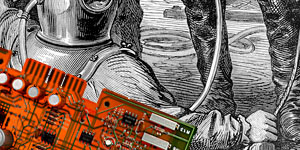


The End of the Beginning
Technology isn't just computers and space ships, video games and cellular phones, atomic microscopes and nuclear weapons. It's plows and needles, paper and pottery, buttons and cloth, light bulbs and plastic bags, shoes and flush toilets. These things don't grow on trees. We made them.Of these artifacts, information manipulators---devices that can sense and respond to changes in their environment and that can follow long and intricate programs of behavior---are the most recent, the most unusual, and perhaps the most feared. Still, since at least the nineteenth century, various technological innovations have been worming their way into every nook and cranny of our society. They now run our civilization for us. Without our numerous artificial helpers we'd often be too slow, too few, too expensive. The catch is that by making and using technology we've made it indispensable. With it, we've quintupled our population in under two hundred years---an unheard-of growth rate for our species. Without it, four of every five of us could die.
Like all technologies, computers have consequences. But because our brain is the source of all our technology, and because computers let our brains think better and faster and cheaper, they have consequences all out of proportion to those of most technologies. Change the brain and you change the world. For example, today's computers are helping us create biotechnology by letting biologists manage the complexity of their task on all levels---from understanding molecular images to organizing drug schedules; from searching for similar genes to handling inventory; from extracting genes to controlling the centrifuge. Take computers away and the pace of biotechnological change would slow to a crawl. As would the pace of change in every other technical field.
Their most important consequence, however, is that the better they are, the better their next generation will be. If each future computer generation midwifes changes as massive as biotechnology, and each generation arrives in half the time of the last one, what might our world become in thirty years? Today, the new thing is the computer. Tomorrow, it will be biotechnology. The day after, it may be nuclear fusion. Next week, machine intellects. The week after, perhaps anything we want made to order, atom by atom. Brave new devices for a brave new world introduced at brave new speeds.
The scientist and the engineer give us those things, but how we use them is up to us. It sounds wonderful to say that our governments should protect our way of life so that we can keep doing the same old things in the same old ways our ancestors did. The same line of thought goes on to say that scientists should stop discovering, inventors should stop inventing, and engineers should stop building. We're comfortable enough as it is. Leave well enough alone.
Well, it sounds wonderful, but it isn't going to happen. Not just because we don't really want it to, but because three-quarters of the world's population isn't anywhere near as well fed, well off, well educated, or well armed as we are. And they definitely want to be. The sooner we accept that, the better are our chances of surviving the future we're so busy crafting for ourselves.
We can no longer expect to learn to live a certain way, then just sit back and vegetate for the rest of our lives. That way lies disaster. Our sole advantage over today's machines is that we can still change faster than they can. We can adapt, and they still can't. So let's use our wonderful adaptability to keep one step ahead of their inevitable encroachment. And let's pray for guidance when comes the inevitable day that they can adapt too; for then, we'll have no advantage at all.